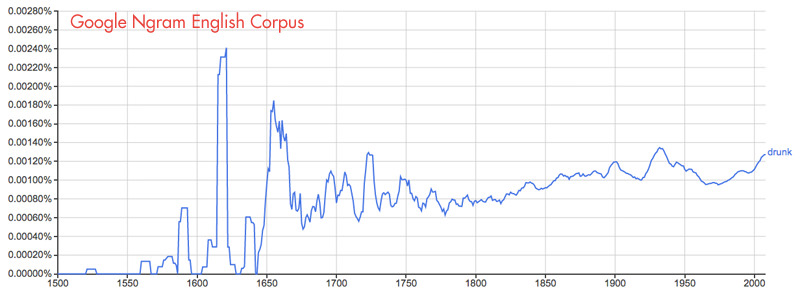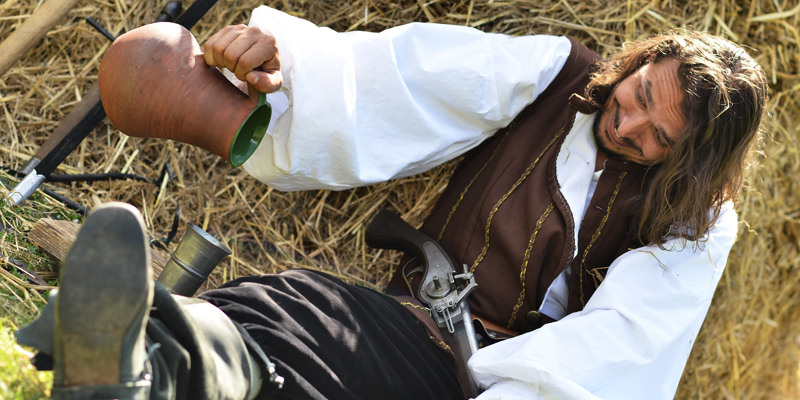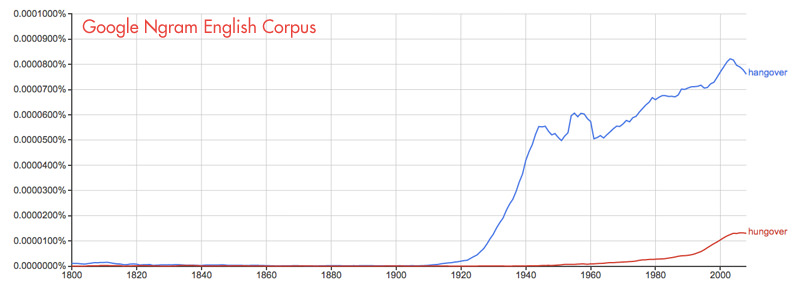A recent article in the Atlantic traced the history of the many words and phrases that English-speaking folks around the world have developed to express the simple fact that someone has had too many drinks. The article utilized David Crystal’s 2014 thesaurus, Words in Time and Place, which itself is based upon the Oxford English Dictionary. We’re still digging through our own copy of the book to prove that there is all sorts of fun to be had reading through a thesaurus with a wine glass in hand. Until then, you’ll want to enjoy this list of the many, many (is one more many one too many…drinks?) ways to express the simple fact that someone had one too many.
Before we begin we should address the word drunk itself. We can trace it back to the Middle English “fordrunken.” As this chart from Google Books’ Ngram viewer shows, “drunk” showed up on the scene in the 1500s. After a brief surge in popularity in the seventeenth century (among the source texts Google has access to), drunk shook off a period of volatility to enjoy a steady climb through modern history. After peaking out in the early 1930s (the combo of the Depression and the end of Prohibition will do that), drunk looked like it was on its way to find a new modern-era peak during the Great Recession.

The origin of many of these phrases – the ‘Three Sheets To The Wind’ in this article’s title is not too difficult among them to discern – are historic artifacts, though their use lives on. Thankfully the O.E.D. is tireless in its efforts to trace the history and evolution of the English language, which the Atlantic was nice enough to jot down. Here’s what they found!
- 1564: Tippled — For tippler, the name for a tavern-keeper
- 1611: Bumpsy — Inspired by the “staggering gait” of the inebriated
- 1627: High — Before Brits discovered weed, they sometimes referred to drunk people this way.
- 1770: Groggy — Having had too much grog, the sailor’s drink of rum and water
- 1811: Lushy — From the slang “lush,” meaning any kind of beer or liquor
- 1897: Up the pole — Another nautical term, probably referring to a mast
- 1917: Blotto — As in, soaks up alcohol like blotting paper soaks up ink
- 1923: Poggled — Has its origins in the Hindi word pagal, for “madman”
- 1943: Plonked — From “plonk,” a facetious pronunciation of vin blanc, or white wine, this term became popular in Australia before spreading to other English-speaking countries.
- 1957: Honkers — Among its many possible roots is the slang verb “honk,” or vomit.
- 1968: Wasted— You can thank the hippies for this one, which, according to Crystal, “suggests that the mind or body of the drunkard is analogous to land which has been devastated or ruined.”
If you are wondering about the phrase “three sheets to the wind,” the Atlantic summarized that one up nicely as well:
If you were on a ship in the early 1800s, you might notice that the three corners of each sail were bound down with ropes. These ropes were called “sheets,” and they served to keep the ship steady in the wind. When the sheets came loose, the vessel would zig-zag to and fro, meandering around the sea like a drunken sailor.
In fact, around 1821 people realized that this might be the best possible way to describe drunken sailors—or drunken anyone, for that matter. It was like they were “three sheets in the wind.”

We’ve concerned ourselves with drinking, but what about the day after? Back in 2008, the New Yorker published a roundup of the many varied words and phrases cultures around the world have developed to refer to the unbearable bleakness of a truly awful hangover. They did not provide the phrases in their original languages, just translations, but they do the job. If you’ve ever experienced such a hangover, the Polish phrase for such an event will resonate: a howling of kittens. What follows are approximate translations of phrases used to refer to a hangover around the world.
- China: “Drunk Overnight”
- Denmark: “Carpenters in the foerhead.”
- Egypt: “Still Drunk”
- El Salvador: “Wake up ‘made of rubber.’”
- France: “Wake up ‘with a wooden mouth’ or a ‘hair ache.’”
- Germany & The Netherlands: “Have a ‘tomcat.’”
- Japan: “Two Days Drunk”
- Poland: “Experience a ‘howling of kittens.’”
- Sweden: “Smacked From Behind”
- Ukraine: The New Yorker reported that they have several words, alluding to the old joke about Eskimos and their many words for snow, but frustratingly they reveal none of them.
- Israel: An addition to the modern Hebrew language, The New Yorker reported that “experts at the Academy of the Hebrew Language, in Tel Aviv, decided that such a term was needed, so they made one up: hamarmoret, derived from the word for fermentation. (Hamarmoret echoes a usage of Jeremiah’s, in Lamentations 1:20, which the King James Bible translates as “My bowels are troubled.”)
Returning to Google’s Ngram Viewer we can see that hangover and hungover are thoroughly modern. Perhaps your grandparents were a bit tougher as so many folks love to claim…

Pirate Images via Shutterstock.com. Charts via Google Ngram.

